|
Southern
Mongolian Human Rights |
|
Information
Center (SMHRIC) |
|
July 26, 2005 |
|
New York |
click here
for the Chinese version of the report.
Additional photos are available at the end of this page!
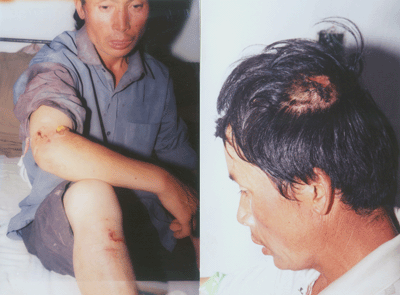 |
|
|
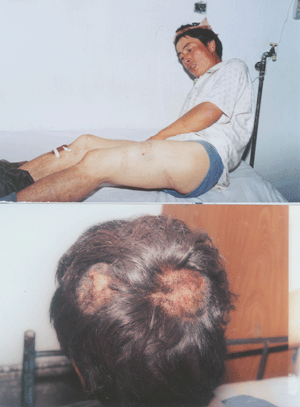
|
|
|
Victim
Nasunbuhe was severely beaten up by police and gangsters on
his head and shoulders. Major hospitals in the Banner and
League were told by the authorities not to accept any victim
of this conflict. A poorly equipped Mongol hospital accepted
them for treatment.
|
|
In April
2004, Liu Fenghai, Vice Secretary of Horchin Right Wing Middle
Banner (“Banner” is equivalent to “County”) in the Inner
Mongolia Autonomous Region, accompanied by Tong Qingchun, Party
Secretary of Hundelen Sum (Town), Tie Liang, head of the Sum,
and Directors Sun and Wu Jinshan of the police department paid a
visit to West Hingan Oboo Gacha (Village), home to 110 Mongol
households. The visit was the beginning of a series of traumatic
events for the Mongol residents which has resulted in the
complete disruption of the community and their way of life.
A meeting
was held with about 80 villagers on a mining plan on the land of
West Hingan Oboo. The officials initially proposed that the Sum
government and the villagers, including two other neighboring
villages of East and Middle Hingan Oboo could share 8 yuan on a
ton of processed iron sand of the mining project. The mining
corporation is co-owned by Liu Fenghai’s nephew and a mining
contractor from the neighboring Chinese province of Hebei. The
villagers did not accept this offer since this mining area would
cover several mountain pastures where they keep their cattle as
well as own several thousand acres of farming land. Furthermore,
the villagers felt the offer was inadequate compensation for
such a huge mining project, with an initial investment of 8
million yuan. They eventually reached an oral agreement that the
miners would pay 2,000 yuan per household to Hingan Oboo
Village.
The
villagers volunteered to help drill wells and do other
construction work for the miners. In November 2004, the
preparation work for the mining was done, but the villagers had
not heard anything about compensation from the authorities or
from the miners. When the villagers asked the miners for the
agreed upon compensation, the miners said they had already paid
it to the Banner and Sum. The villagers went to the Sum
authorities (Tong Qingchun and Tie Liang) to ask for their
compensation. Tong Qingchun told the villagers that Secretary
Liu Fenghai of the Banner is in charge of the compensation and
Sum authorities do not know the current regulation and policy
about the mining. The villagers could not afford at that time to
travel 80 kilometers to go to the Banner government in the
middle of a busy farming season. Therefore, the villagers argued
with the miners and tried to stop the mining pending their
compensation. As a result of the conflict, the door and windows
of the miner’s office were broken, although no bodily injuries
were reported. A few days later at midnight, however, the police
broke into several houses in the village and arrested three
villagers – Dafuyu, Amorjurhe and Tegshbayar. They were beaten
up by the police and jailed for more than a week. They were then
transferred to a Labor Correction Center to do hard labor on a
farm. The villagers could not tolerate this oppression and
humiliation by the authorities. They called up over 200 adults
(almost all adults in the village) and drove tractors and horse
carts to Bayanhoshuu, where the Banner government is located, to
question the justification for the arrests. They spent three
nights outside on the street in their carts and tractors. During
the day, they sat down quietly in front of the Banner government
building to protest the authorities’ arbitrary arrests and
deceitful action. On the last day, a spokesman from the police
department told the crowd that their “fellow rioters” will be
released under the condition of creating no more “disturbances”
to the mining. He even stressed a point that anyone who
“harasses” the miners will be arrested and jailed for up to 10
years. When one brave villager asked the reason for the arrest
of the three fellow villagers, the spokesman said that the three
had been at the forefront of the rioting.
Following
this, the police sent five officers to guard the mining
operation. The police officers frequently sped into the village
in their cars to intimidate the villagers at various times of
the day and night. It was clear to the villagers that the mining
project represented clear collusion between the government
officials and businessmen. Throughout this ordeal, the villagers
have felt confusion, trauma and alienation as a result of the
actions of the authorities. The party secretary and the head of
the Hingan Oboo Gachaa have both colluded with the mining
operation businessmen in clear opposition to the interests of
the now disenfranchised villagers. Despite the authorities’
intimidation, most villagers are determined to continue their
fight against a lawless government and greedy businessmen.
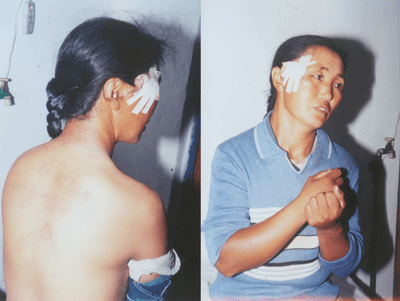 |
|
|
Victim Ms.
Huaraa was seriously beaten up by police and gangster during
the conflict.
|
|
In late
June, 2005, a new round of struggle and suppression took place
in Hingan Oboo.
The miners
ripped open a mountain ridge, a natural grazing land, to pave a
shortcut road to transport their processed iron sand. Otherwise,
they claimed, that would have to use the village road. The
villagers expressed their concern to the local authority about
losing cattle and other property due to this additional
destruction of pasture lands. But Fu Liuzhu, an official of
Hundelen Sum, and Bayansang, the party secretary of Hingan Oboo
Gachaa, gave the miners permission to open up the mountain
ridge. The angry villagers gathered on the mountain to block the
road construction. Again a new clash erupted when police
officers ordered a bulldozer driver to run over villagers and
tried to shoot at the crowd with their guns. During the fight,
many villagers were beaten up by the heavily armed police. Some
police officers sustained minor bruises and their vehicle
windows were broken by the angry villagers. This incident caused
the villagers to get even more nervous and frightened. The
villagers worked on their fields during the day and stood guard
with 20 people per shift at night for fear of the police
reprisals against the villagers.
On July 13th,
2005, Liu and Tong visited the miners. Then they sent Bai Jinsuo
of Hundelen Sum to the village. Bai told the villagers that he
would come back within two days to announce the resolution by
the Banner and Sum authorities. He never came back and a phone
call from Tong declared that both the Banner and the Sum
authorities chose not to be “involved” in the conflict between
the villagers and the mining corporation. He also announced that
the authorities will pull back their police force. Villagers did
notice that with the police withdrawing, six carloads of about
thirty individuals were brought in by the miners carrying a
variety of lethal weapons. Now the villagers were extremely
desperate, frightened and disappointed by the decision taken by
the authority. Villagers realized now that this mining is not
only official-businessman collusion but had escalated into
collusion involving gangsters. The villagers expected bloodshed
and harsh punishment by the government.
We will
send out updates as we receive them. In the meantime, our
earnest hope is for the safety of the poor villagers.
Follow-up
1:(July 18, 2005)
On July 18th,
2005, about 178 adults from the village set up camps in the
mountains to try to block the road construction and mining. The
gangsters did not confront the villagers. But only a couple of
hours later, when the villagers had camped on the mountain, a
truckload of 50 fully armed police led by Wu Jinshan and
several cars came to the mine. The Police on the truck were
swinging their batons toward the villagers and some of them were
even aiming at the villagers with their rifles. The conflict did
not take place immediately because the villagers were relatively
tolerant and also because the police and the miners saw the
number of villagers was greater then their own. But in the
afternoon, some villagers had to go back to the village to pick
up meals which were prepared by kids and elders at home for the
crowd. On their way back to the mountain, the returning
villagers were ambushed and attacked by the hatchet men.
Villager Nasunbuhe and Huara were seriously injured on the head
and two other villagers were also severely injured. Nasunbuhe
and Huara were sent to the hospital in Bayanhoshuu. The photos
will become available soon.
Contact
number:
Any of the
villagers in West Hingan: +011 86 (482) 491-4058. This line is
probably under surveillance and may be blocked. No villager is
proficient in Chinese, so speaking Mongolian is required.
Follow-up
2: (July 21, 2005)
Phone
service in Hingan Oboo is currently not available. Following is
the most recent information obtained from the neighboring
village by telephone:
1. The
phone lines in Hingan Oboo village are currently disconnected;
2.
Electricity was cut off by angry villagers. They are trying to
stop the mining process by cutting the power off;
3.
Nasunbuhe (who was injured during the attack) got 15 stitches on
his head and is not able to speak. He is suffering from frequent
vomiting and is delusional. Huara was unconscious for two days
and is still in critical condition;
4. Six
other people were injured by the police and gangsters during the
ambush attack;
5.
Villagers all moved to the mountain to block the transportation
of the iron sand;
6.
According to a villager in the next town, the police force has
been doubled to more than 100 armed police now;
7. Since
the distance between the mountain and the village is about 2
kilometers (1.25 miles), the crowd’s food supply from the
village is becoming difficult. Road side attacks and ambushes by
the increasing numbers of police and gangsters are becoming
common place in the village;
Pictures
of the incident will be posted on our website upon receipt.
P.S. The
villagers also have photos of Amurjurhe’s scars on his back and
arm. He was tortured in jail by police last winter. He still can
not do farm work.
Follow-up
3: (July 22, 2005)
Chinese
Police Opens Fire on Mongol Villagers in Southern (Inner)
Mongolia
Around
4:00 AM on July 21,2005, Wu Jinshan, Vice Director of Horchin
Right Wing Middle Banner, led 60 policemen to attack some of the
camps in the mountain and arrested 6 villagers: Dalangurav,
Muuhuu, Yeson, Li Temure, Bayanbaatar, and Mandu. Among them,
Mandu has diabetes and Dalangurav went through a stomach surgery
13 days ago. Police also battered Shanlong to break his leg.
Shanlong’s wife Huuireech and Mandu’s wife Huudaguul were also
beaten up by the police. When the bigger crowd of villagers were
aware of the attack and tried to rescue their folks, police and
gangsters opened fire on the crowd. Two people were critically
injured. Villager Mr. Saraa’s body was embedded with 18
soybean-size metal grains, and Ulan’s head was ripped open an
inch big hole. Fulin and several others were injured and the
scene was like a battle zone. The number of the police and the
gangsters totaled more than 100, and all wore uniform and
helmet, holding metal shields and metal rods. Villagers threw
stones and wood from mountain tops, and the police threw tear
gas, grenades and other explosives. The battle lasted over an
hour and some 200 villagers from the neighboring villages came
to help the Hingan Villagers. The police and gangsters were
retreated because of the overwhelming number of the villagers.
But the police vowed to attack again and invade the village to
abduct children and elders.
During the
bomb explosion and gunshots some helpers from outside dialed
both the emergency number 110 and the number for the Police
Department of Hingan League (District). The authorities there
replied that they would not be involved in this case even if any
death occurs because the villagers are against “our Government
and the Party.”
Now the
villagers are anticipating bigger battle and are being forced to
be well-prepared to protect themselves from the police attack by
making explosives and home made guns. More bloodshed is around
the corner and consequences could be even more tragic.
Eight
important figures in this conflict on the government-businessmen
side:
1. Liu
Fenghai, Vice Secretary of the Party, Horchin Right Wing Middle
Banner, Hingan League, “Inner Mongolia Autonomous Region”;
2. Bu Teqi,
Secretary of the Party, Horchin Right Wing Middle Banner, Hingan
League, “Inner Mongolia Autonomous Region”;
3. Wu
Jinshan, Vice Director of Public Security Bureau (Police),
Horchin Right Wing Middle Banner, Hingan League, “Inner Mongolia
Autonomous Region”;
4. Wang
Guotao, General Manager of the Tangshan Mining Corporation from
the neighboring Chinese province of Hebei;
5. Tong
Qingchun, Secretary of the Party, Hundelen Sum, Horchin Right
Wing Middle Banner, Hingan League, “Inner Mongolia Autonomous
Region”;
6. Tie
Liang, Head of Hundelen Sum, Horchin Right Wing Middle Banner,
Hingan League, “Inner Mongolia Autonomous Region”;
7.
Bayansang, Secretary of the Party, Hingan Oboo Village of
Hundelen Sum, Horchin Right Wing Middle Banner, Hingan League,
“Inner Mongolia Autonomous Region”;
8. Bulag,
Head of Hingan Oboo Village of Hundelen Sum, Horchin Right Wing
Middle Banner, Hingan League, “Inner Mongolia Autonomous
Region”.
P. S.:
Nasunbuhe, the wounded villager, went through operations on his
head and a leg. Currently he is in critical condition and was
sent to the city of Tongliao, Inner Mongolia for serious
operations and treatment.
Follow-up
4: (July 24, 2005)
1.
Photos of the victims became available on our website:
www.smhric.org
;
2. Police
raided the village again at 5 o’clock early morning of July 23.
Many villagers were beaten up, and Ms. Eryatuu was arrested by
the police. Police fled when bigger crowd of villagers gathered
to rescue her;
3.
According to an official of Hundelen Sum, who asked not to be
identified, Police Department of Hingan League dispatched
additional 100 police to join the Banner to suppress the
villagers;
4. The
authority issued a wanted circular to capture Mr. Dafuyu. Police
stationed more than 50 personnel in posts on all the roads to
block the passages to the village. The authority also
disconnected all of the phone lines and cell phones in the
village. Villagers stay in Mountains at night and hide in wild
weeds in the deserted crop field. Villagers do not know how to
fill their stomach without crop yield this year. Police and
gangsters are patrolling the empty village to pick up unlucky
preys (villagers). This peaceful village has never experienced
this kind of disastrous and traumatic event even during Kuo Min
Tang or Japanese occupation eras;
5.
Villager Tielin saw that the police and the miners planted
landmines around the mining area, and even detonated several of
them to test the power of the explosives;
6. The
authorities and the miners leveled the other side of the
mountain ridges and paved a broad road, which destroyed large
area of forests, grazing land, and entire landscape.
Furthermore, this project broke the natural barrier of the
village to the neighboring Han towns. Land degradation will be
further deepened, and the possibility of loss of cattle will be increased dramatically;
Follow-up
5: (August 3, 2005)
Following
is the photos of the local Mongolian victims of the incident:
|
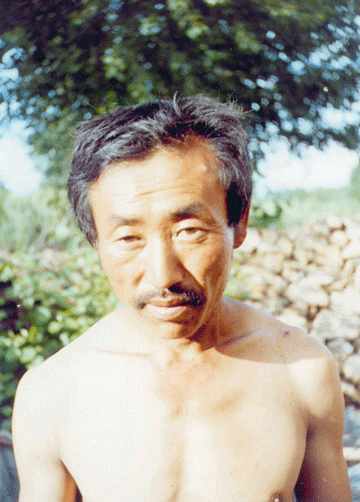 |
|
Mr. Saraa’s
body was embedded with 18 soybean-size metal grains. Two of
them, one on his shoulder and another on his head, are still
visible on the picture.
|
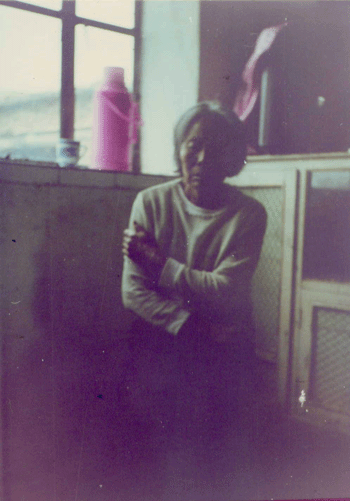 |
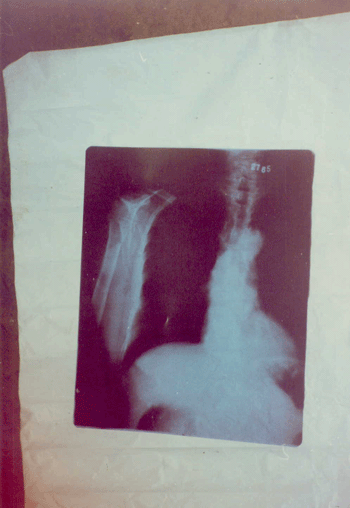 |
|
Victim
Ms. Huudagulaa was seriously injured when she was severely
beaten up by the police and thugs during the clash. The
right is an X-ray image of her injured arm.
|
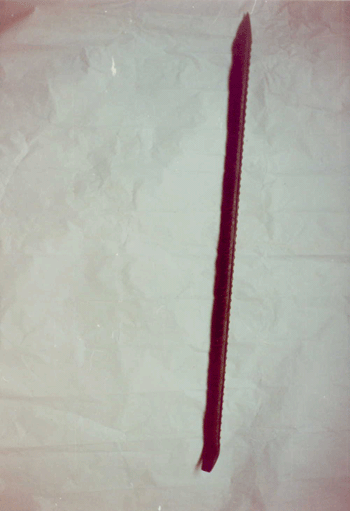 |
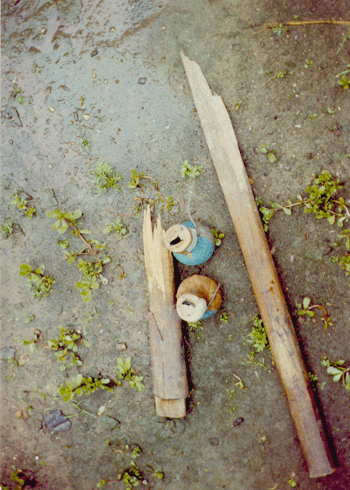 |
|
Iron
bars, wooden sticks, and explosives used by the police and
thugs to attack the villagers.
|
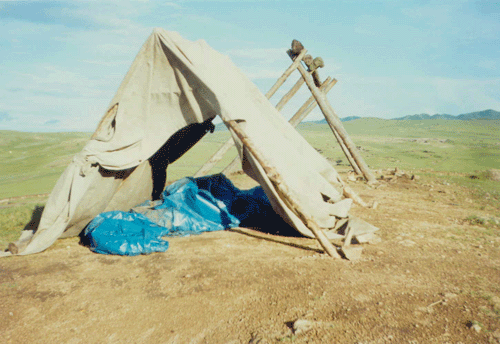 |
|
Makeshift tents of the villagers were attacked and
demolished by the police when the villagers tried to stop
the mining operation and road construction.
|
|





